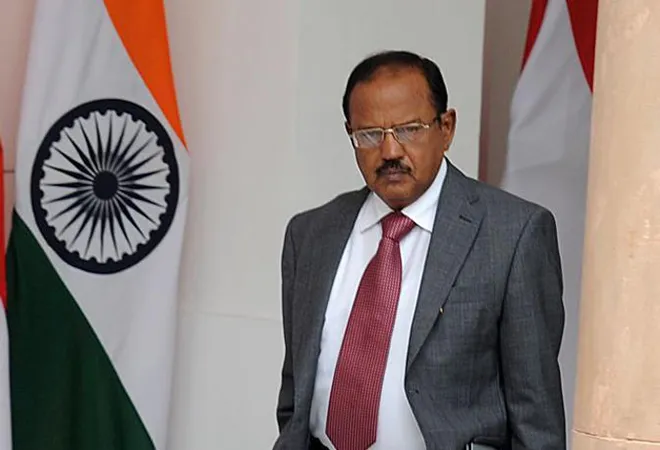-
CENTRES
Progammes & Centres
Location
With Amit Shah and Jaishankar at the helm of the ministry now, Doval's multi- faceted role might be curbed.

National Security Adviser Ajit Doval’s elevation to a cabinet rank from that of a minister of state was inevitable. First, it marked the prime minister’s approbation of a person said to be one of his closest advisers. Secondly, since the very nature of Doval’s job brings a considerable overlap with the work being done by the new Home Minister Amit Shah, and the External Affairs Minister S.Jaishankar, there was a need to rework his official seniority in the interests of the smooth functioning of the national security system.
In the previous government, Home Minister Rajnath Singh was often out of the loop on issues related to his ministry, whether they were the Naga peace talks or decisions on Jammu & Kashmir. The agency heads of the Intelligence Bureau, Research and Analysis Wing, and the National Technical Research Office (NTRO) reported to Doval on a daily basis. He was also involved in the apex affairs of the Central Bureau of Investigation and the National Investigation Agency.
Rajnath Singh did not challenge this situation and so there was no need to rejig Doval’s seniority. < style="color: #000000">Amit Shah is likely to be a hands-on minister who, if anything, is even closer to the prime minister, and will, without doubt, assert the formal authority of the Union home ministry over the IB and NIA.
Following the Mumbai attacks in 2008, Prime Minister Manmohan Singh ordered the then NSA MK Narayanan to attend the regular morning security meetings convened by the Union home minister. Since the NSA was junior to the home minister, it was not a problem, though it did cause some discomfort to the powerful incumbents of the office.
NSA Ajit Doval had largely avoided attending the morning meetings even though he was effectively running the internal security policy of the government with regard to the Maoists, J&K and the Northeast. Given the powerful incumbent in the home ministry now, Doval will have to work out a new equation on these areas.
Likewise, the then Foreign Secretary Jaishankar had worked out a modus vivendi of sorts and was unerringly polite with Doval even though the two of them did have their differences on matters of policy and its execution. From the outset, and based on decisions taken by the Vajpayee government, Doval had the primacy in dealings on the border issue with China as the Special Representative (SR) of the Government of India. Subsequently, in the UPA period, the SR’s remit was expanded to cover probably the entire gamut of the Sino-Indian relations. Pakistan became an adjunct of sorts, since India’s relations with Pakistan are more often than not viewed through the lenses of national security.< style="color: #000000">As the External Affairs Minister, Sushma Swaraj had understood that the key areas of foreign policy are often looked after by the prime minister of the day.
She also accepted the fact that the PM often relied on other channels of advice on those issues, sometimes reaching out to the MEA bureaucracy, bypassing her.
Under Jaishankar, this situation will undoubtedly change. Adjustments will not be easy and it is best to have them done through two high-profile incumbents, both with special equations with the PM, being given an equal rank.< style="color: #000000">In Modi’s first term, Doval, as the NSA, was able to involve himself in the responsibilities of other ministries like home, defence and external affairs. This will not be the case in the home and external affairs ministry now.
With these ministries being helmed by two powerful cabinet ministers, Doval’s chairmanship of the Strategic policy group too will be somewhat constrained. Neither is it likely that the NSA will get the virtual free run he had of the defence ministry as the Chairman of the Defence planning committee. This being said, it needs to be pointed out that Doval’s plate has been over-full for quite some time. He has many other responsibilities for supervising the external and technical intelligence agencies, and maintaining India’s nuclear defence posture.
But all these issues will be subsumed by another very fundamental change: Modi now has the cumulative experience of matters relating to national security and foreign policy, gathered by him in his first term. This will make the issues much more familiar to him and also probably encourage him to be more assertive.
When he became the PM in 2014, Modi was not experienced in foreign and security policy. He relied on his important ministers and officials to carry out his policies. Jaishankar and Doval probably played an out-sized role in his foreign policy overdrive which yielded somewhat mixed results. Whether it was relations with Nepal, Pakistan or China, there were huge ups and downs.< style="color: #000000">The policies now will have a much greater stamp of Modi’s personal views, inclinations and authority. In essence, Doval, Shah and Jaishankar will be running a ‘Modi policy.’
They may have considerable autonomy, but at the end of the day, it will be within the boundaries established by the boss. It is fairly easy to see how this will impact Doval and Jaishankar, but the ‘joker in the pack’ is Amit Shah; just how he’ll affect the play is difficult to predict.
This commentary originally appeared in The Quint.
The views expressed above belong to the author(s). ORF research and analyses now available on Telegram! Click here to access our curated content — blogs, longforms and interviews.

Manoj Joshi is a Distinguished Fellow at the ORF. He has been a journalist specialising on national and international politics and is a commentator and ...
Read More +